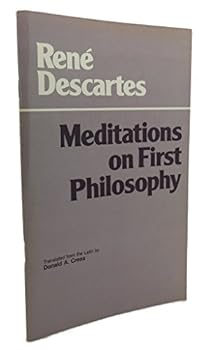Meditations on First Philosophy: In Which the Existence of God and the Distinction of the Soul from the Body Are Demonstrated
(Part of the Penguin Great Ideas Series Series and Cambridge Philosophical Texts in Context Series)
Select Format
Select Condition 
Book Overview
Pour les connaisseurs avanc?s du Latin, un dictionnaire ?lectronique Latin est quand m?me recommend?. This description may be from another edition of this product.
Format:Hardcover
Language:English
ISBN:0915144573
ISBN13:9780915144570
Release Date:January 1979
Publisher:Hackett Publishing Company
Length:56 Pages
Weight:0.29 lbs.
Customer Reviews
4 ratings
The roots of the Scientific Method
Published by Thriftbooks.com User , 16 years ago
I really am pleased that I read this book because within its pages you can see the birth of our modern world. Despite the fact that Rene contorted himself to try to prove that God exists; he still managed to create a great work. He began the inquiry into reality wherein we try to understand the world through experimentation. I think he failed in many ways to develop a coherent philosophical structure due to his attempts to please the Church but given the social conditions of the day this was the best that he could do. Even in this flawed analysis Rene paved the way for what would later become the Scientific Method. I only wish that he could live today and write without fears of reprisal from religious entities.
The best introduction to modern philosophy in a reliable and cheap edition!
Published by Thriftbooks.com User , 19 years ago
Descartes' meditations really is the place to start for thinking through the philosophical obsessions of the modern era -- the value of skepticism, the nature and extent of knowledge, the relation between mind and body, the role of theology in a rational account of the universe, subjectivity vs. objectivity, the primacy of the subject, freedom, etc. This is a book that can be read for these themes even by those who are encountering it for the first time without guidance. At the same time this is a book that rewards reading and rereading, not only in the sense that you should read it more than once but that you should come back to it again and again after you have read the other classical works of philosophy that both preceeded it and that it paved the way for. After a serious study of Kant, for example, you may find that you can come back to Descartes and see that much of the work of Kant's critical project was already prepared for in this little treatise. That is not to say that Kant is not original, but that part of Kant's genius is in thinking through and making explicit the scope of the philosophical landscape that was first mapped out in the Meditations.
First philosphy-- rene discartes
Published by Thriftbooks.com User , 24 years ago
Rene Discartes, one of the greatest philosophers of all time, proposes his theories on the existance of God and on the human soul. This book is an exploration into the mind of the man who said "I think, therefore i am." In Discartes' First Philosophy he thinks twice about things that many of us don't think about once, and proposes not only his ideas, but also his thought process in coming to those ideas. This book is a 'must-have' in the collection of anyone who can appreciate deeper thought.
whoever asked what's true about truth?
Published by Thriftbooks.com User , 24 years ago
each and every day we take the world in and we make a very crucial decision: is this or that true? is this or that false? and if we take a step further we might find ourselves using the word "why" more often than usual. Why is this true? how do i really know? This is exactly what Descartes is getting at with Meditations on First Philosophy. The first time I read it, I found myself re-reading again and again; underlining portions to make the very act of re-reading easier. One must posess maticulousness and great patience to truely envelop the concepts brought forth by Descartes in this work. If you read it not to understand what is behind truth and error, then read it to experience the drama and beauty that Descartes employs to present the logic that founds his conclusions. If you wish to explore what one man found when he asked, "how is it that we can distinguish between reality and dream, and why is it that humanity is plagued by error?", then you must immerse yourself in this book, and pay it the maticulous attention that it demands.





